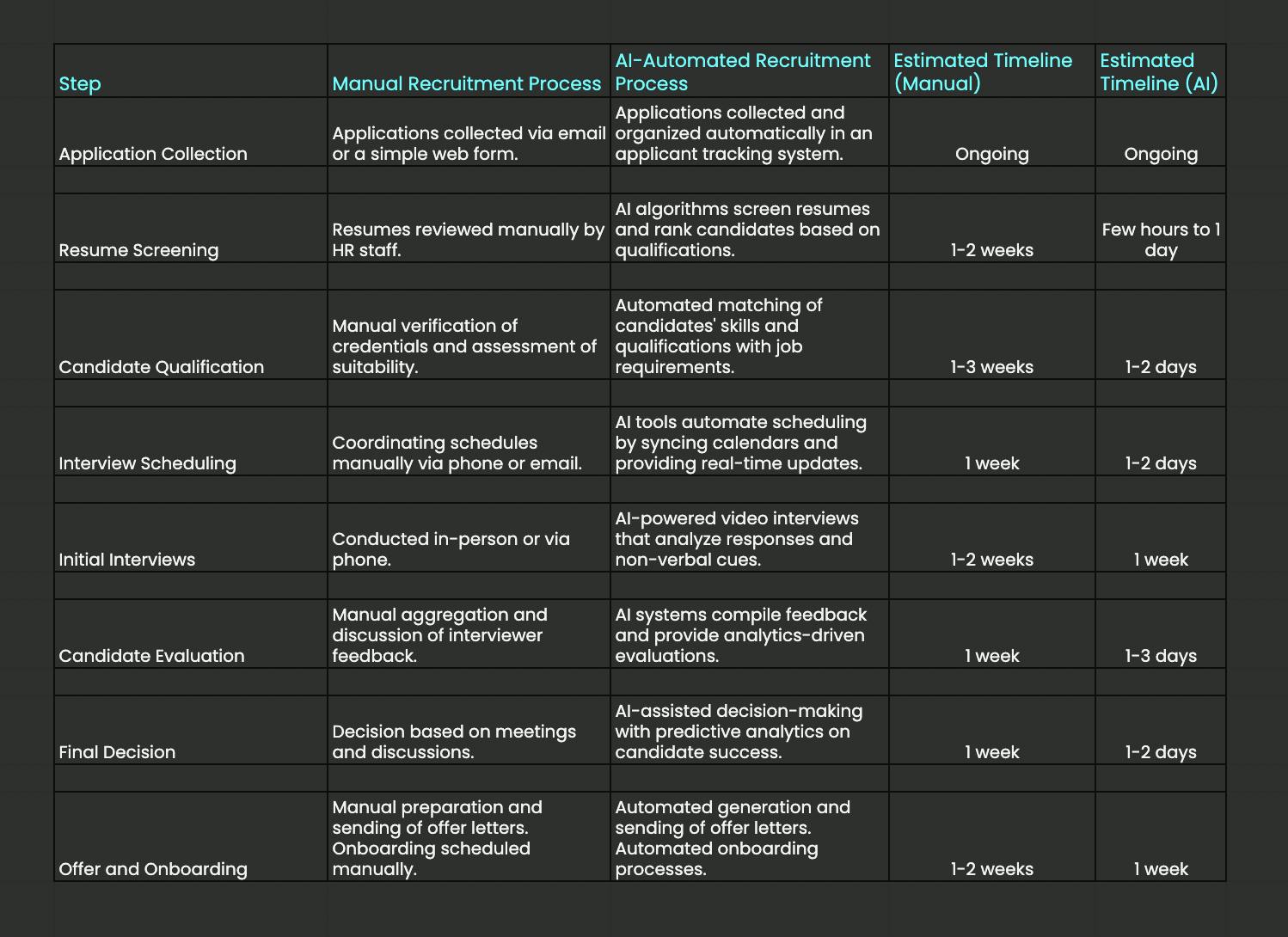Optimizing Hiring Efficiency: The Impact of AI Automation in Recruitment Processes
Introduction
In today’s highly competitive job market, automating the recruitment process using Artificial Intelligence (AI) isn’t just an advantage—it’s essential. Recruitment Process Automation (RPA) leverages powerful technologies like AI and machine learning to streamline hiring by automating repetitive tasks. This transformation not only reduces the administrative burden but also significantly cuts down the time-to-hire, offering substantial cost savings and improved operational efficiency - and hiring quality.
In practical terms, traditional manual recruitment processes are both time-consuming and costly. By integrating AI-driven recruitment automation, we can reduce these time and cost demands by an impressive 60-70%. For a company making just 50 hires per year, this equates to annual savings of between €250,000 and €300,000, depending on your specific industry and geographic location.
We have experience in developing recruitment automation solutions, and the outcomes have been positive. The following list of the steps in the recruitment process describes how the time savings are achieved.
Recruitment Process Steps & Explanation:
- Resume Screening: AI algorithms can quickly sort through thousands of resumes, identifying key qualifications efficiently.
- Initial Candidate Assessment: Online assessments can be automated and scored by AI.
- Scheduling Interviews: AI scheduling tools can coordinate times without human intervention.
- Conducting Initial Interviews: AI can conduct basic initial interviews via chatbots, although more complex assessments still require human interaction.
- Candidate Shortlisting: AI can help in ranking candidates based on predefined criteria.
- Reference Checks: Automated emails and data collection can be handled by AI.
- Final Decision and Offer: While AI can help in gathering all final documentation and analysis, the final decision often requires a human touch.
This list provides a general idea of where AI can help streamline recruitment processes, saving significant time at various steps. However, the exact savings can vary depending on the specific industry and implementation.
Integrating Artificial Intelligence in our recruitment process automation enhances both efficiency and the accuracy of candidate selection. AI helps ensure that only the most suitable candidates are brought onboard. Through sophisticated algorithms, AI evaluates each applicant's qualifications, ensuring your team gains skilled and well-matched members without the complexity.
Example Case: Automate recruitment process - outreach & engage
One of our customers identified outreach and engagement as the most time consuming and monotonous tasks in their recruitment process. We developed and implemented an AI-driven recruitment automation solution that led to substantial time savings compared to existing human-driven processes.
Below a breakdown of the estimated time savings:
- Outreach and Communication: Manual outreach involves crafting individual emails, making calls, and managing follow-ups, which is highly time-consuming. An AI system automates these communications, ensuring that hundreds of personalized messages are sent out instantly and systematically. This can save approximately 70-80% of the time typically spent on these tasks.
- Candidate Engagement: Keeping candidates engaged through the recruitment process requires consistent and timely interactions. AI can manage these interactions around the clock without fatigue, saving recruiters significant time, often up to 60-70%, by handling routine inquiries and updates automatically.
Overall, when these aspects were combined, an AI-driven recruitment system is realistically reducing the time spent on these tasks by about 40-50% compared to traditional methods. This enables recruitment professionals to focus more on strategic tasks like interviewing highly qualified candidates and improving the overall hiring strategy, rather than spending time on routine and administrative tasks.
What´s next - Candidate qualification?
One of the AI possibilities in recruitment, would be using AI for candidate qualification. Qualifying candidates is arguably one of the most critical yet time-consuming stages in the recruitment process. Integrating AI could revolutionize this phase by automating the evaluation of applications against job requirements. AI algorithms could swiftly analyze, not only the qualifications and experience listed in resumes but also glean insights from candidates' online activities and portfolios. This dual approach would ensure a more thorough assessment than traditional methods, significantly speeding up the process. Furthermore, AI can help identify subtle qualities that might indicate a good fit for the company's culture or the specific nuances of the role. As in the examples before, by automating candidate qualification, recruiters can focus their efforts on engaging the most promising candidates, ensuring a more strategic use of their time and resources.
Manual Recruitment process vs. Recruitment powered by AI
Below is a comparison table outlining the differences between manual and AI-automated recruitment processes, including estimated timelines for each step:
This table shows the contrast in time and effort required at each step of the recruitment process when done manually versus when automated by AI. AI significantly reduces the time taken for most tasks, allowing recruitment teams to focus more on strategic decisions and candidate engagement.

Let's sum up the individual steps from the comparison table provided earlier

For Whom is AI-Driven Recruitment Automation Most Beneficial?
AI-driven recruitment automation transcends traditional recruitment platforms by leveraging advanced machine learning algorithms and data analytics. This technology is not just about automating tasks; it’s about enhancing the recruitment process with superior intelligence and predictive capabilities. Here’s who stands to benefit most from adopting AI-driven recruitment automation:
- High-Volume Recruiters: For sectors like retail, hospitality, or any industry with substantial recruitment needs, AI-driven platforms can process vast amounts of applications quickly, accurately, and with minimal oversight. Unlike basic automation, AI can learn and adapt to improve both the speed and the quality of the screening processes over time.
- Organizations Experiencing High Employee Turnover: Industries such as BPOs, retail, and construction that typically see high turnover rates can utilize AI to not just fill positions quickly but predict candidate success and fit to reduce turnover rates. AI systems analyze historical data and behavior patterns to forecast which candidates are likely to stay long-term.
- Innovative Startups and SMEs: Startups and SMEs aiming for rapid growth can leverage AI-driven recruitment to ensure they not only fill positions quickly but also smartly, by identifying candidates who demonstrate growth potential and alignment with the company’s culture, something traditional platforms might overlook.
- Companies Prioritizing Quality of Talent: AI-driven recruitment platforms are particularly beneficial for industries where the quality of hires is crucial, such as in technology, finance, and healthcare sectors. These platforms offer advanced candidate assessment tools that evaluate technical skills, cognitive abilities, and cultural fit using sophisticated algorithms, ensuring a higher caliber of candidate selection.
- Global Enterprises: For multinational corporations, consistency in recruitment standards across various geographical locations can be challenging. AI-driven systems ensure global consistency and compliance in hiring practices, equipped with the capability to analyze and adapt to regional employment laws and cultural nuances automatically.
AI-driven recruitment automation offers a strategic advantage by not just performing tasks but by enhancing the decision-making process with robust analytics and predictive insights. This allows organizations to not only improve efficiency but also significantly uplift the quality of their hires—making it a game-changer for those looking to lead in an increasingly competitive market.
The Future of AI in Modern Recruitment
Artificial Intelligence (AI) in recruitment can be compared to a turbo boost for hiring professionals, significantly amplifying their efficiency and effectiveness. This doesn't mean that the entire hiring process should be automated. Instead, the true winners in recruitment are those who adopt AI strategically—starting quickly but improving incrementally.
To fully grasp the transformative power of AI in recruitment, an organization must begin at the foundation. The most likely starting point? Automating routine tasks. This initial step not only streamlines processes but also provides a tangible demonstration of how AI can revolutionize the way we attract and select top talent. By beginning here, businesses can gradually unfold the broader potential of AI, ensuring that every phase of the recruitment process is optimized for success in the digital age.
Automating Routine Tasks
A significant portion of a recruiter's day is often consumed by routine administrative tasks such as scheduling interviews, sending follow-up emails, and sorting through applications. AI can automate these processes, freeing up recruiters to focus on more strategic activities such as candidate engagement and relationship building. Automation ensures that the recruitment process is not only faster but also less prone to errors, leading to a smoother candidate experience and more efficient overall operations.
Continuous Learning and Improvement
AI systems are inherently designed to learn from each interaction and continuously improve over time. This means that the more the AI is used, the better it becomes at identifying the right candidates, predicting outcomes, and streamlining processes. Continuous learning allows AI tools to stay up-to-date with the latest recruitment practices and adapt to changing job requirements and candidate expectations.
By integrating AI into your recruitment strategies, recruitment professionals can effectively multiply their capabilities, making the process faster, more accurate, and less labour-intensive. This 'steroid' effect not only boosts the productivity of individual recruiters but also elevates the strategic position of the entire recruitment function within an organization. AI, therefore, is not just a tool but a transformational force that reshapes how talent acquisition is approached in the modern workplace.
Development of AI-Driven Recruitment Automation by Nieve Consulting
Recruitment Process Automation with AI offers a compelling advantage for organizations aiming to stay agile and innovative. At Nieve Consulting, we are at the forefront of integrating generative language models to enhance recruitment processes, ensuring our clients can meet their operational and strategic goals. As the recruitment landscape continues to evolve, embracing AI-driven automation will be key to achieving sustained success and competitiveness in the market.
You can accelerate your recruitment process with Nieve Consulting’s AI development sooner than you probably would think. Our development strategy allows for a modular, step-by-step implementation. This approach means you can start seeing tangible benefits almost immediately, even as we continue to refine and expand the system. Each phase will be designed to quickly integrate with your existing processes, ensuring you can gain efficiencies and improvements right from the start.

CEO
